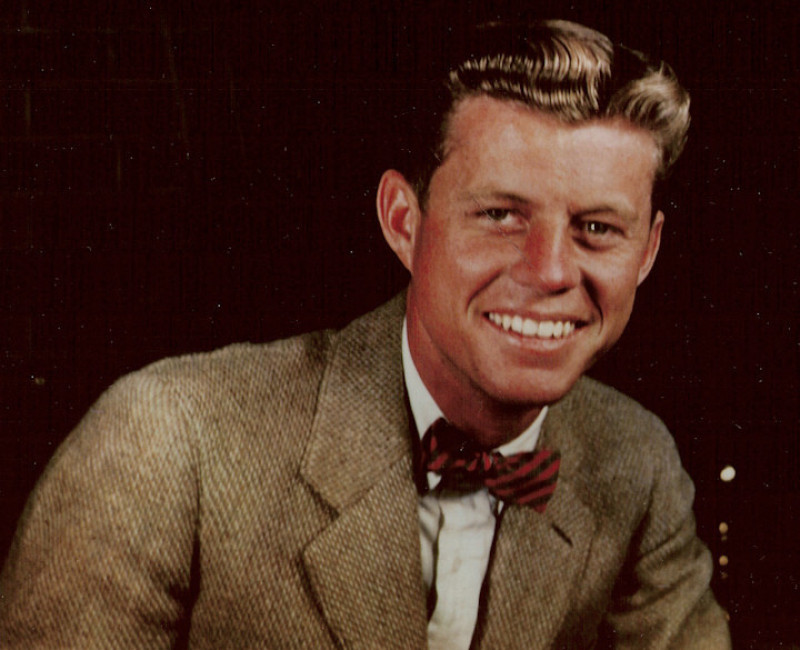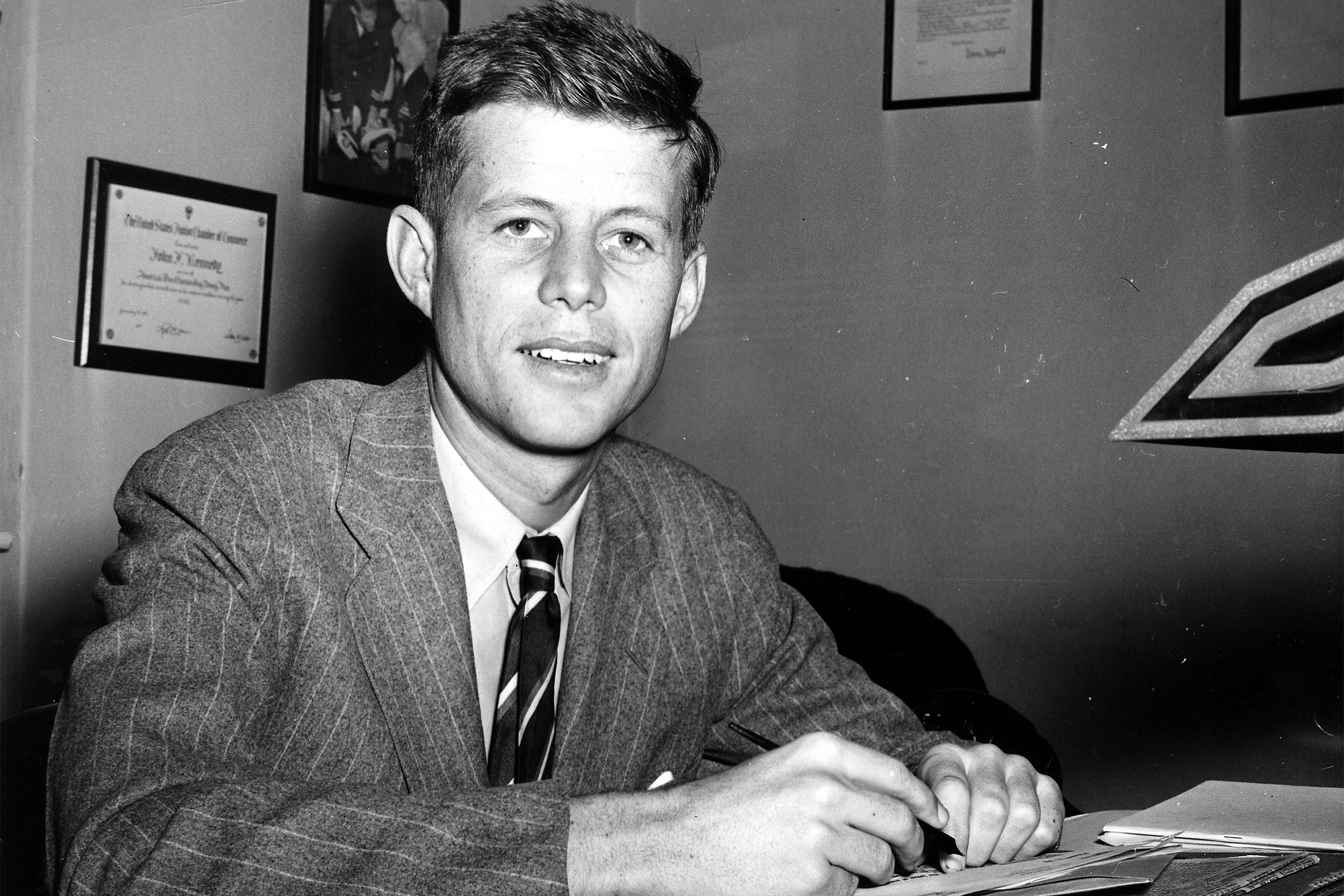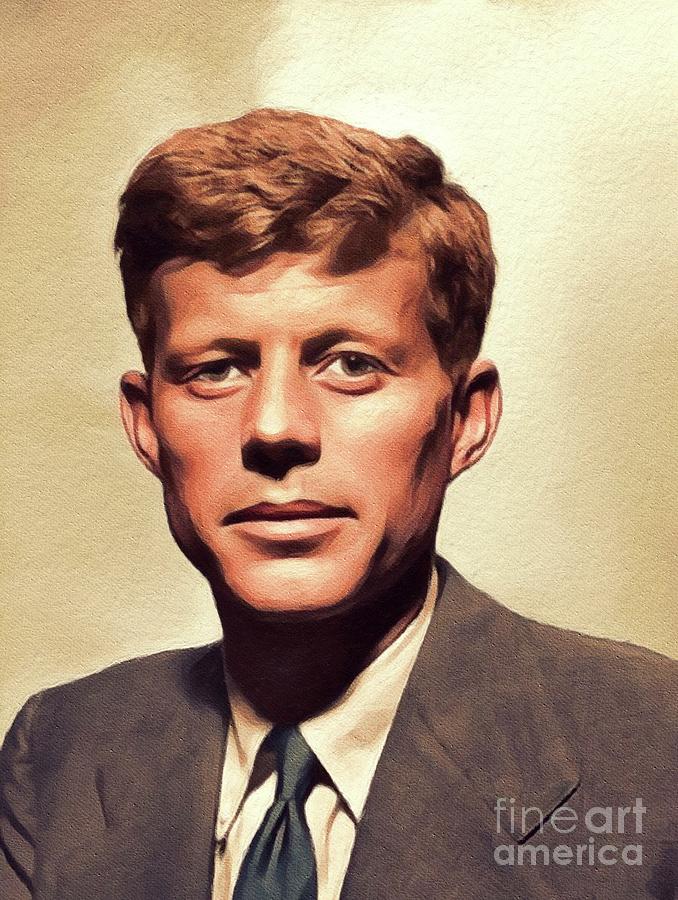For many, the name John F. Kennedy brings to mind a leader, a speaker, someone who held a very important job in our country. Yet, before he became the thirty-fifth president of the United States, before the speeches and the big moments, there was, you know, a young man. He was, actually, a kid, growing up, more or less, like many others, in a way, just with a slightly different background. It’s almost like looking at a photograph from long ago, seeing the person before they became the figure we often think of, a person who was just starting out on their path.
We often picture him in the White House, or perhaps giving one of those memorable talks that really moved people. But, you know, there's a whole story about the years that came before all of that. It’s about the person he was as a boy, a teenager, and a young adult, the kind of person who would, for instance, have a report card, or be seen in family pictures. My text, actually, helps us get a glimpse into these earlier times, showing us a side of him that might not be the first thing that comes to mind, which is, honestly, quite interesting to consider.
This look back will take us through his childhood, the family he grew up with, and some of the things that, in some respects, made him the person he became. We'll explore his beginnings in Brookline, how his family's way of life influenced him, and the steps he took on his way to a very public role. It’s a chance to see, you know, the foundations of a life that, eventually, touched so many, and to understand, basically, the earlier chapters of a story that is, still, told and retold.
Table of Contents
- JFK Young - A Look at His Life
- A Look at the Early Life of JFK Young
- What Was JFK Young Really Like?
- How Did His Family Shape JFK Young?
- When Did JFK Young Start Making a Difference?
- What Was the Path for JFK Young to the Presidency?
- The 1960 Election and JFK Young's Big Win
- JFK Young's Vision for the World
JFK Young - A Look at His Life
John Fitzgerald Kennedy, a person who would, eventually, hold the highest office in the land, began his life in a place called Brookline, Massachusetts. He came into the world on the twenty-ninth day of May, in the year nineteen seventeen. This was, you know, the start of a life that would, later on, become very public and, in a way, quite significant for many people. His early years, in fact, were spent in a home that, for the first four years, was rather modest, considering the kind of family he belonged to. It’s interesting to think about the contrast between those simple beginnings and the later grandeur associated with his name. He was, actually, a member of a family that was, basically, quite extraordinary in American life, known for being involved in various pursuits, from starting businesses to leading in government and community efforts. This background, you know, played a big part in shaping the person he became, even as a young one. It’s like, the very air he breathed was filled with a sense of purpose and, perhaps, a bit of expectation, too.
A Look at the Early Life of JFK Young
When we think about John F. Kennedy, it's often the image of a seasoned leader that comes to mind. But, you know, to really get a sense of him, it helps to go back to the beginning, to the time when he was just a kid, a very young one, in Brookline. He was born on May 29, 1917, and his early days were, actually, spent in a home that, for the first few years of his life, was, in a way, quite ordinary. This was before the family's wealth truly blossomed and before they moved to grander places. It's almost like seeing the very first brushstrokes on a canvas that would, later, become a very detailed and well-known painting. His childhood, as a matter of fact, was part of a story that would, eventually, include his time as the thirty-fifth president of the United States. We can, you know, look at old report cards and family pictures to get a sense of what those early years were like for the person who would become such a notable figure. It gives us a window into the making of a public servant, starting from his very first days.
| Full Name | John Fitzgerald Kennedy |
|---|---|
| Date of Birth | May 29, 1917 |
| Place of Birth | Brookline, Massachusetts |
| Family Background | Prominent Irish-American family with wealth, strong Roman Catholic beliefs, and deep involvement in Democratic politics. |
| Early Years Description | Spirited, sometimes mischievous, growing up in a household with high expectations and a sense of public duty. |
| Path to Presidency | Began with early life experiences, education, military service, and political roles as a congressman and senator, leading to the 1960 election. |
| Presidential Term | 35th President of the United States (1961-1963) |
What Was JFK Young Really Like?
So, you might picture a future president as always serious, always focused, but that wasn't, actually, the whole story for John F. Kennedy when he was young. My text, for instance, paints a picture of a kid who was, quite frankly, spirited. He was, you know, the kind of child who might get into a bit of mischief, a troublemaking kid, as it’s put, growing up in Brookline. This gives us a much more human view of him, doesn't it? It's not just about the leader, but the person who, in a way, had a very normal, if somewhat boisterous, childhood. We can, for example, look at his old report cards, which, you know, probably tell a story of a bright mind that, perhaps, didn't always apply itself in the most conventional ways. Family photographs, too, show glimpses of a young person, just being a young person, surrounded by his relatives. It's a reminder that even those who go on to achieve great things started somewhere, often with a good deal of youthful energy and, sometimes, a bit of a playful streak. He was, in short, a lively individual, even from a very early age.
- Odelya Halevi
- Christine Baumgartner
- Bob Bryar Cause Of Death
- Nick Cannon Children
- Ryan Bingham And Hassie Harrison
How Did His Family Shape JFK Young?
The family John F. Kennedy grew up in was, in a way, quite remarkable, and it certainly played a big part in shaping the person he became, you know, even as JFK young. My text tells us that this was a family defined by some very strong characteristics: a lot of wealth, a deep connection to Roman Catholicism, active involvement in Democratic politics, and a structure that was, you know, very much guided by the father figure. It was, basically, a household where expectations were probably quite high, and where public service was, in some respects, a natural path. His father, for instance, had really big hopes for his two older boys, John and his brother Joe. They were seen as, you know, very appealing, agreeable, and intelligent young men. Joe, actually, was the one who, early on, made it clear he had ambitions for a public role. This kind of environment, with its strong values and clear direction, would have, naturally, influenced how young John saw the world and his place in it. It wasn't just a family; it was, you know, almost like a training ground for future leaders, instilling a sense of purpose and, perhaps, a drive to achieve. So, the family's presence was, definitely, a guiding force in his early life.
When Did JFK Young Start Making a Difference?
It's interesting to think about when a person like John F. Kennedy, even as JFK young, started to develop the ideas that would later guide his actions as a leader. My text, for instance, points out that he had the opportunity to travel, visiting Asia as a congressman. During these trips, he actually saw, firsthand, what colonial oppression looked like. This experience, you know, seeing people living under the control of others, seems to have had a real impact on him. It led him to believe something quite important: that if young nations were offered freedom and help with their development, it could, in some respects, stop the spread of certain ideas or influences that he viewed as, basically, unhelpful. This wasn't just a passing thought; it was, apparently, a conviction that began to take root. So, even before he held the highest office, he was, in a way, thinking about global issues and how the United States could play a role in helping other countries find their own way. It shows a growing awareness and a sense of responsibility that, eventually, would become central to his approach to the world.
What Was the Path for JFK Young to the Presidency?
The journey from a spirited kid in Brookline to the leader of a country is, you know, quite a story, and for John F. Kennedy, it was a path that unfolded over many years. My text touches on this, describing the time from his birth in 1917 all the way up to the elections of 1960. He was, in fact, New England’s "golden boy," a person who seemed to have a certain appeal and promise. This wasn't something that happened overnight; it was, basically, a gradual build-up of experiences and roles. He moved from being, you know, just a young man to serving as a congressman, then a senator, gaining experience in the workings of government and public life. Each step along the way was, in a way, a part of his preparation for the bigger role that awaited him. The biography, for instance, offers a lot of information about his childhood, his life experiences, the things he worked on, his accomplishments, and a timeline of how it all happened. It shows how the person he was in his earlier years, the JFK young we are talking about, slowly but surely became the man who would, eventually, seek and win the presidency. It's a narrative of growth and, you know, a steady move towards a very public purpose.
The 1960 Election and JFK Young's Big Win
The year nineteen sixty was, actually, a very significant one for John F. Kennedy, and for the country, too. My text mentions that the presidential election that year was, basically, one of the closest in American history. It was a moment of real tension and, you know, a lot of anticipation. On November 9, 1960, the results showed that John F. Kennedy had won. This was, in some respects, a truly remarkable achievement for several reasons. He became, for instance, the youngest man ever elected to the presidency of the United States. This was, you know, a big deal, a sign of a new generation stepping into a very important role. But that wasn't the only thing that made his win stand out. He was also, in fact, the first Roman Catholic in American history to win the presidency. This broke new ground and, in a way, showed that the country was ready for a different kind of leader. It was a victory that, honestly, had many layers of meaning, marking a moment of change and, you know, a new chapter in the nation's story. His charisma, the way he spoke, and his ability to inspire people were, apparently, big factors in this success.
JFK Young's Vision for the World
Even as a younger person, John F. Kennedy, the JFK young we’ve been discussing, began to form ideas about the world and America's place in it. My text touches on his understanding of global affairs, particularly his observations during his time as a congressman when he traveled to Asia. He saw, you know, the real impact of colonial rule, how it affected people and nations. This experience, apparently, shaped a very clear belief in him: that offering newer, developing nations their freedom and providing them with help to grow could, actually, be a way to prevent other, perhaps less desirable, influences from taking hold. He believed, in a way, that supporting independence and progress abroad was a key to a more stable world. This vision, which he held even before he became president, shows a forward-thinking approach to foreign relations. He wasn't just focused on domestic matters; he was, in fact, thinking about how the United States could act as a positive force on the global stage. It was a perspective that, you know, would later guide many of his policies and speeches, aiming to inspire a sense of shared purpose among nations. He had, basically, a clear idea of what he wanted to achieve on a global scale.
This article has explored the early life of John F. Kennedy, focusing on his childhood in Brookline, his family's influence, and the path that led him to the presidency. We looked at how he was a spirited, sometimes troublemaking kid, growing up in an extraordinary family known for its wealth, Catholic faith, and political involvement. We also touched on his experiences as a congressman, seeing colonial oppression firsthand, which shaped his belief in offering freedom and aid to young nations. The article discussed his historic win in the 1960 election, becoming the youngest and first Roman Catholic president. We considered how his early years and family background contributed to the person he became, a leader remembered for his charismatic way of speaking and his ability to inspire others.


